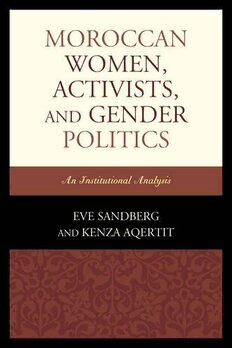
Moroccan Women, Activists, and Gender Politics: An Institutional Analysis PDF
Preview Moroccan Women, Activists, and Gender Politics: An Institutional Analysis
Eve Sandberg dedicates this book to her late, beloved Aunt, Ann Cohen, who offered Eve support in all its forms and who modeled how to live one’s life so as to become enriched in every year, even at 107. Kenza Aqertit dedicates this book to her mother, Halima Bouchfer, for her sup- port and encouragement throughout Kenza’s academic and professional years to think bigger, aim higher and challenge different political and cultural barriers to women. Moroccan Women, Activists, and Gender Politics Moroccan Women, Activists, and Gender Politics An Institutional Analysis By Eve Sandberg and Kenza Aqertit LEXINGTON BOOKS Lanham • Boulder • New York • London Published by Lexington Books An imprint of The Rowman & Littlefield Publishing Group, Inc. 4501 Forbes Boulevard, Suite 200, Lanham, Maryland 20706 www.rowman.com 16 Carlisle Street, London W1D 3BT, United Kingdom Copyright © 2014 by Lexington Books All rights reserved. No part of this book may be reproduced in any form or by any electronic or mechanical means, including information storage and retrieval systems, without written permission from the publisher, except by a reviewer who may quote passages in a review. British Library Cataloguing in Publication Information Available Library of Congress Cataloging-in-Publication Data Sandberg, Eve Nan, author. Moroccan women, activists, and gender politics : an institutional analysis / Eve Sandberg and Kenza Aqertit. pages cm ISBN 978-0-7391-8209-3 (cloth : alk. paper) -- ISBN 978-0-7391-8210-9 (electronic) 1. Women--Morocco--Social conditions. 2. Women political activists--Morocco. 3. Women--Legal status, laws, etc.--Morocco. 4. Women (Islamic law)--Morocco. 5. Sex discrimination--Morocco. I. Aqertit, Kenza. II. Title. HQ1791.S35 2014\ 305.420964--dc23 2014025389 The paper used in this publication meets the minimum requirements of American National Standard for Information Sciences—Permanence of Paper for Printed Library Materials, ANSI/NISO Z39.48-1992. Printed in the United States of America Table of Contents Preface ix Acknowledgments xi Chapter 1 Institutional Theories, Feminist Theories, and Moroccan Women Activists 1 Chapter 2 Creating Morocco’s Post-Independence Gender Institution 23 Chapter 3 The Agency of Moroccan Women 45 Chapter 4 Changing Rules and Paths within Institutions and the Creation of Discursive Initiatives to Alter Morocco’s Gender Discourses 67 Chapter 5 Resources 103 Chapter 6 The Sum is Greater Than Its Parts 121 Chapter 7 Conclusion 143 Bibliography 151 Index 161 About the Authors 171 Preface As participant observers to the work that Moroccan women gender activists were accomplishing 1985-2010, we felt we needed to tell their stories. Because Moroccan women met with such good success, we felt we all could learn from their strategies. To improve the status of women in any country is a difficult task. Moroccan women have worked for decades, achieving some major victo- ries even though more work remains to be done. How they have achieved their victories is the subject of this book. Borrowing from the theoretical perspective of institutionalism, the book offers a template for change to those who theorize about gender advocacy and to those who practice it. We, as authors, believe that our personal epistemologies have influenced the research methods we have chosen and the manner in which they are em- ployed. That one of us is a Moroccan citizen of Berber descent and one of us is a citizen of the United States (a first generation citizen whose father came from a village in ByloRusso) means that our world theoretical understandings often are dissimilar in important ways. Our life experiences, also dissimilar in many ways, however, overlap in some ways so that, as researchers, we share enough episte- mological understandings that we are able to collaborate on this project. We believe that acting as authors who come from different cultures but who seek to navigate each other’s culture has provided our work with a richer multi- dimensional understanding of our subject matter than just one of us could have achieved alone. Additionally, the “insider-outsider” research issue takes on an important dimension in our methodology because both authors have been participant ob- servers in some aspects of the subject matter of this study. Beginning in early November 2001, the American author has been a participant observer, conduct- ing training workshops for Moroccan women seeking public office, particularly parliamentary office. Also in 2001, the American author conducted workshops for the Executive Boards of a number of Morocco’s political parties to assist with their planning, targeting, and messaging prior to the 2002 election. In De- cember 2007, she offered a workshop module and then served as a facilitator for a dialogue between heads of Moroccan NGOs and representatives of Morocco’s parliament. The American is a tenured academic with a Ph.D. in Political Sci- ence from Yale University. She Chairs the Politics Department and teaches at historic Oberlin College. She is the President of a small political consultancy firm based in Oberlin, Ohio U.S.A (Strategic Research Inc.), and a two-term locally elected official. Beyond conducting workshops and giving talks on vari- ous aspects of democratization in Morocco and the U.S., she has also worked on campaigns, advocacy training, and state-NGO relations in Jordan, South Africa, Namibia, Zambia, Tanzania, and Ethiopia, which informs her comparative ix
